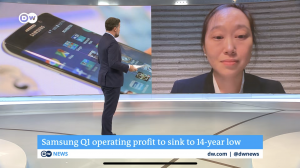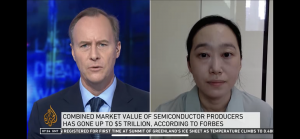
Semiconductors and AI Supremacy
Since the Japanese export curbs on semiconductor fabrication materials against South Korea in July 2019 (which ended upon South Korea’s withdrawal of WTO case DS590), I have been researching on the geoeconomics of chip supply chains. My current focus is on AI chip manufacturing capacity build-up in different jurisdictions in the AI revolution and the possible regulation on AI chips in terms of investment and access to technology.
For the past five years, I have researched on the chip competition at the jurisdictional and firm levels. Notably, I have closely followed U.S. industrial policy and export controls of semiconductor supply chains (Trump’s Huawei ban for 5G chips, 2022 and 2023 BIS export controls under Biden, and the Chips and Science Act subsidy provisions and guardrails). While in Washington, Seoul and Tokyo between in 2022-2023, I have given numerous briefings on chips and industrial policy for policy think-tanks in Washington and Seoul as well as diplomatic missions in Seoul and Tokyo, in addition to speaking in academia and providing commentary to international media.
Below are my previous and ongoing engagements on chips, industrial policy and artificial intelligence.
Public Speaking
- Panel 2, ‘The International Semiconductor Landscape: ‘Siliconpolitik’ and Global Partnerships,’ Semiconductors, AI and Global Economic Security: A Framework for International Strategic Cooperation, Centre on Emerging Technologies and Security, Alan Turing Institute, British Library, London, United Kingdom (May 7, 2024)
- June Park. “The Race for Supremacy in AI Chips: Industrial Policy, Export Controls, and Investment Restrictions.” Panel 4: ‘International Developments in Supply Chain Resilience Amid De-Globalisation,’ Asia-Pacific Programme for Senior National Security Officers (APPSNO) 2024: Defining the State of Security in Uncertain Conditions: Lessons and Responses, Centre of Excellence for National Security (CENS), S. Rajaratnam School of International Studies (RSIS), Nanyang Technological University (NTU), Singapore (April 14-19, 2024)
- June Park. “AI Chip Competition amid U.S. Chip Export Controls Expansion into the Gulf.” Non-Brown Bag Seminar, Middle East Council on Global Affairs, Doha, Qatar (March 26, 2024)
Policy Work
- (Closed) Virtual workshop 1 on ‘The Revival of Industrial Policy and Competition with China,’ Trilateral U.S.-ROK-Japan Cooperation on Economic Security, Center on Asian Policy Studies (CAPS), Foreign Policy Program, The Brookings Institution. (April 25, 2024)
- (Closed) Virtual expert workshop on ‘U.S.-Japan-South Korea trilateral cooperation on in building resilience against economic coercion and sustaining the rules-based international economic order,’ Center for East Asia Policy Studies (CEAP), Foreign Policy Program, The Brookings Institution (June 14, 2023)
- (Closed) Virtual expert workshop on ‘U.S.-Japan-South Korea trilateral cooperation on export controls and technology competition,’ Center for East Asia Policy Studies (CEAP), Foreign Policy Program, The Brookings Institution (April 25, 2023)
- ‘South Korea and the New Geoeconomics of Asia,’ Center for East Asia Policy Studies (CEAP), Foreign Policy Program, The Brookings Institution, Washington, DC USA (May 25, 2022) Panel Recording

- (Closed) Virtual expert workshop on ‘South Korea’s role in regional economic architecture and supply chain resilience,’ Center for East Asia Policy Studies (CEAP), Foreign Policy Program, The Brookings Institution (November 16, 2021)
Peer-Reviewed
- (Under review) June Park. “The Race for Supremacy in AI Chips: Industrial Policy, Export Controls, and Investment Restrictions.”
This is a continued project that has evolved from my work on vaccines and semiconductor supply chains at Princeton University as a Fung Global Fellow at PIIRS (2021-2022).
Policy Reports
- June Park. “AI Competition amid Expansion of U.S. AI Chip Export Controls into the Gulf.” Issue Brief, Middle East Council on Global Affairs. June 2024.
This report is an outcome pf my ongoing project at the Middle East Council on Global Affairs as part of my project, ROK-GCC.
 June Park. “Is Economic Security National Security? Defining South Korea’s Economic Security for Future Industries.” Section 1: Economic Security From Multiple National Perspectives, Korea Policy, 1(3): 52-69. Korea Economic Institute of America, Washington, DC. January 4, 2024. Presentation Recording
June Park. “Is Economic Security National Security? Defining South Korea’s Economic Security for Future Industries.” Section 1: Economic Security From Multiple National Perspectives, Korea Policy, 1(3): 52-69. Korea Economic Institute of America, Washington, DC. January 4, 2024. Presentation Recording 
This publication is an outcome of the joint conference between the Korea Economic Institute of America and the University of Texas at Austin held in Austin, TX USA on October 18, 2023.
 June Park. “Semiconductors in Key European and Indo-Pacific Economies: Geopolitical Risk in the Supply Chains into 2030 and Beyond.” in Paul van Hooft, Benedetta Girardi and Alisa Hoenig eds., ‘Access or Absence: Supply and Maritime Security in the Indo-Pacific,’ The Hague Center for Strategic Studies (HCSS). November 20, 2023.
June Park. “Semiconductors in Key European and Indo-Pacific Economies: Geopolitical Risk in the Supply Chains into 2030 and Beyond.” in Paul van Hooft, Benedetta Girardi and Alisa Hoenig eds., ‘Access or Absence: Supply and Maritime Security in the Indo-Pacific,’ The Hague Center for Strategic Studies (HCSS). November 20, 2023.
This report is an outcome of the HCSS Hybrid Workshop held on March 7, 2023. A study trip to Taiwan on semiconductors was conducted with HCSS in July 2023.
Podcasts
 “South Korea’s Semiconductor Strategy: Economic ties are being reshaped by the semiconductor industry’s evolution.” The Sound of Economics, Bruegel, February 28, 2024. (Recorded in Doha, Qatar & Brussels, Belgium, February 23, 2024). Host: Yuyun Zhan and Alicia Garcia-Herrero.
“South Korea’s Semiconductor Strategy: Economic ties are being reshaped by the semiconductor industry’s evolution.” The Sound of Economics, Bruegel, February 28, 2024. (Recorded in Doha, Qatar & Brussels, Belgium, February 23, 2024). Host: Yuyun Zhan and Alicia Garcia-Herrero.
TV Interviews
 ‘Samsung cuts chip production after profits plunge,’ Deutsche Welle – Business, April 7, 2023.
‘Samsung cuts chip production after profits plunge,’ Deutsche Welle – Business, April 7, 2023.
 ‘Global Semiconductor Shortage,’ Al Jazeera – Live News Bulletin, August 20, 2021.
‘Global Semiconductor Shortage,’ Al Jazeera – Live News Bulletin, August 20, 2021.
Newspaper Interviews
- ‘Exportcontroles Japan op chiptechnologie,’ NOS, March 17, 2023.
Radio Interviews
- ‘Ook Japan overweegt exportbeperkingen op chiptechnologie naar China,’ NOS, March 17, 2023.
Op-Eds in the East Asia Forum (EAF)
For my standalone op-eds in the East-Asia Forum regarding chips, please read the below:
- June Park. ‘U.S. Deals with Japan and the Netherlands signal to Heightened Competition in Semiconductor Equipment,’ East Asia Forum. April 26, 2023.
This piece is the fourth of my EAF Semiconductors series.
- June Park. ‘The United States doubles down on its tech war with export and IP controls that target China but also hit Taiwan and South Korea,’ East Asia Forum. November 30, 2022.
This piece is the third of my EAF Semiconductors series.
- June Park. ‘The United States is determined to dominate the semiconductor tech war,’ East Asia Forum. August 6, 2021.
This piece is the second of my EAF Semiconductors series.
- June Park. ‘Semiconductor tech war underlies the Japan–South Korea trade dispute,’ East Asia Forum. September 24, 2019.
This piece is the first of my EAF Semiconductors series.
Academia
- “Getting the Industry Right: Semiconductor Export Controls and Chips & Science Act Subsidies from the Perspective of Industries.” Cyber Salon, Center for Cyber Strategy and Policy, School of Public and International Affairs, University of Cincinnati, Cincinnati OH USA (Online) (November 3, 2023)
- ‘The Weaponization of Supply Chains in the Contactless Economy under COVID-19: The Role of the U.S.-China Race for Supremacy in AI in the Japan-South Korea Chip War,’ 1) Project on Navigating the Emerging Geoeconomics Order, School of Regulation and Global Governance (REGNET), Australian National University, Canberra, Australia (August 17, 2021); 2) Session on East Asian Diplomacy, Early Career Researchers and Graduate Students Conference, ‘East Asia on the Move: Shifting Dynamics,’ The University of Edinburgh, Scotland, United Kingdom (September 2, 2021); 3) Department of Political Science, the Asian Studies Program and the Chinese Studies Program & the Political Economy Program, Rhodes College, Memphis, TN USA (October 12, 2021); 4) Japanese Politics Online Seminar Series (JPOSS)/Program on U.S.-Japan Relations, Weatherhead Center for International Affairs, Harvard University, USA (October 22, 2021); 5) The 13th Annual Convention of Korean International Studies Association (KISA) & the 15th Congress of Asian Political and International Studies Association 2021, “Operationalizing an East Asian Community of Peace and Development: Challenges and Opportunities,” Ewha Womans University, the Friedrich Ebert Stiftung and the Korea Foundation (KF) through Osaka School of International Public Policy (OSIPP), Seoul, South Korea and Osaka, Japan (November 26-27, 2021); 6) East Asia Study Group, University of Warwick, Coventry, United Kingdom (December 2, 2021); 7) Panel on Technology and Economics at conference, “Uncertainty: The Indo-Pacific Region and American Foreign Policy,” America in the World Consortium (AWC), University of Texas at Austin (March 4, 2022); 8) Department of Government, Georgetown University (April 8, 2022); 9) [CLOSED] Korea Institute for International Economic Policy (KIEP), Sejong, South Korea (July 19, 2022); 10) [CLOSED] Japan Foundation Cultural Center, Seoul, South Korea (July 30, 2022); 11) [CLOSED] Global Asia Initiative, NYU Abu Dhabi, Abu Dhabi, United Arab Emirates (September 12-16, 2022) 12) Horizons in Japanese Politics and Foreign Policy, Columbia University, NY, USA (December 2, 2022)
